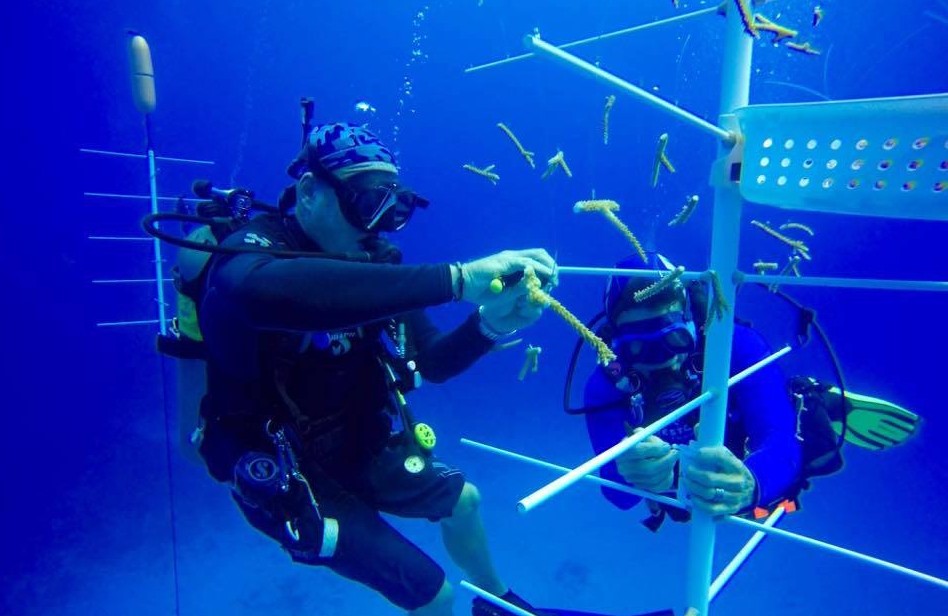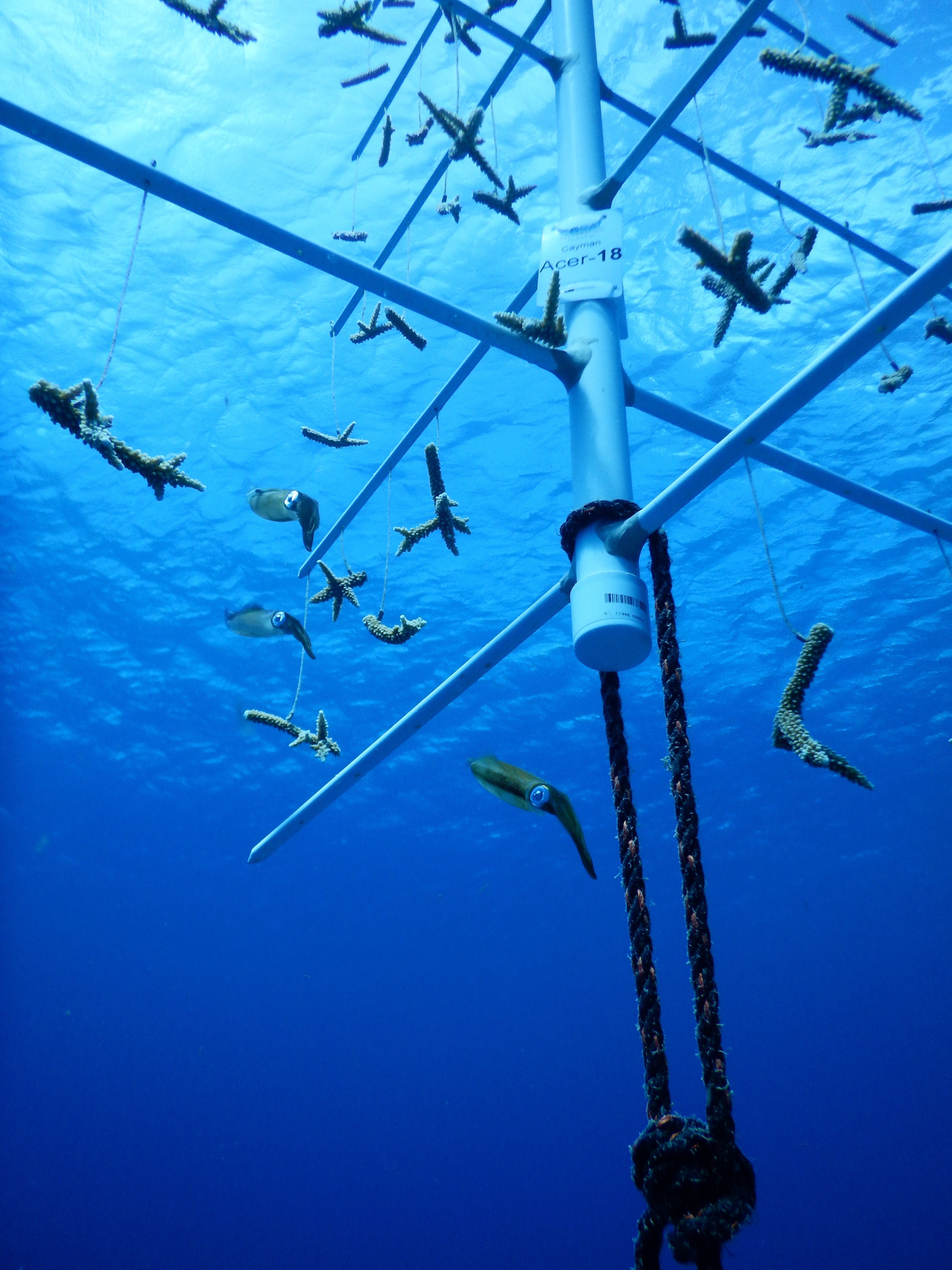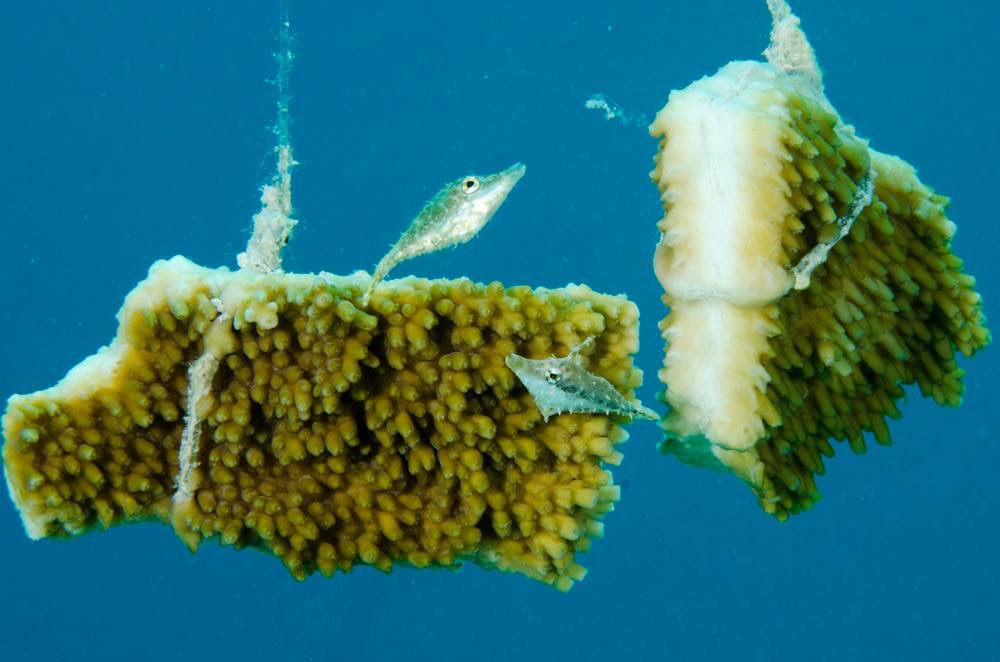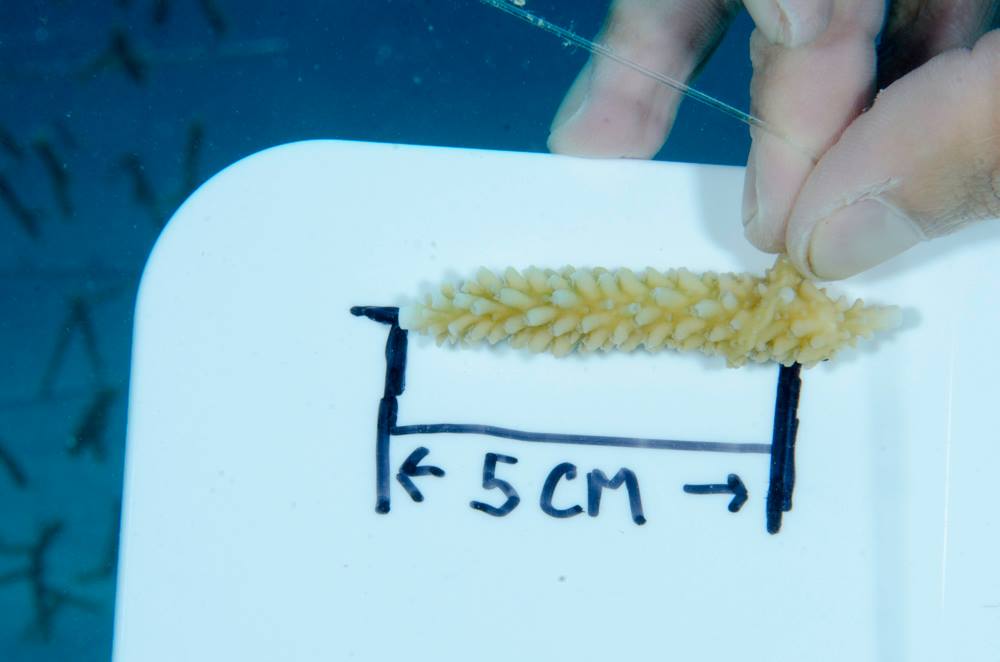Marine Life & Conservation
Cayman’s Coral Nursery Program Launched with High Hopes

After only a few short weeks, hundreds of coral fragments hanging from “trees” made of PVC pipe in the shallow waters of Grand Cayman are showing healthy signs of life and attracting fish. Ocean Frontiers, Sunset House and Divetech are gardening coral that will be used to replenish Cayman’s reefs. The Cayman Islands Department of Environment granted the operators permits to set up the coral nurseries and is overseeing their individual programs.
 “So far everything looks great! There has been zero mortality from the collected coral,” says Lois Hatcher who is managing the nursery for Ocean Frontiers. “We are doing weekly maintenance on the site and setting up a report for the Department of Environment. The fragments are being monitored for disease, photographed and measured. They already show visible growth after just a few weeks.”
“So far everything looks great! There has been zero mortality from the collected coral,” says Lois Hatcher who is managing the nursery for Ocean Frontiers. “We are doing weekly maintenance on the site and setting up a report for the Department of Environment. The fragments are being monitored for disease, photographed and measured. They already show visible growth after just a few weeks.”
The coral trees were set up in late April with the help of Sea of Change Foundation, an ocean conservation non-profit that donated money and materials to construct the PVC trees, plus guidance and manpower. Experts from the Coral Restoration Foundation were brought in to help install the trees and train the dive operators in how to manage the nurseries.
“Every year the Foundation picks a project that we believe will make a difference in saving our seas, and this year we picked Cayman’s coral nursery program,” said board member Jerry Beaty. “We’ve seen this method succeed in other places and because Cayman is such a prime dive destination, we want to do what we can to keep it that way.”
Each coral tree, which can hold about 100 coral fragments, is anchored to the sea bottom with rope and can float with the currents, even during storms and hurricanes. The coral fragments feed from the nutrient-rich currents and they grow. Cayman’s nurseries contain fast-growing Staghorn Corals. Nursery tenders clean and maintain the coral trees to find the strongest corals which will then be used to “seed” local reefs.
“I was out cleaning the nursery the other day and everything looks very healthy and all of the fragments have already grown over the fishing line that is attaching them to the trees. Very exciting!” says Jo Mikutowicz, Divetech.
“The staghorn has already grown between .5 cm to 2.5 cm based on the 5 cm baseline fragments that were hung. On the Elkhorn it’s great to see the mono that was wrapped around the fragment as they have overgrown already,” said Lois Hatcher.
The Sunset House coral nursery has attracted a small school of curious squid.
“The nursery is doing very well, and there’s also a lot of interest from guests,” says General Manager Keith Sahm. “The trees are strategically placed and depth changeable to accommodate the nursery, and keep it safe from a late season Nor’wester.”
Dive operators, staunch advocates for protection of the marine environment, have always enforced conservation measures to reduce the stress on Cayman’s reefs from divers. The chance now to be directly involved in growing coral to seed and boost the reefs is exciting and fills them with purpose.
“It requires a lot of work on Divetech’s part to maintain the coral trees weekly, to keep algae off of them and keep any predators (snails and fire worms) off the coral,” explains Jo Mikutowicz. “We are very dedicated to this nursery program being a success and will put in all the work that is required to maintain them.”
With coral reefs threatened worldwide from overfishing, rising water temperatures, ocean acidification, pollution and more, Cayman’s operators are excited about the good things that will result from their new coral nurseries.
“It sometimes seems like there is a lot working against coral to stay alive and be healthy these days so it’s nice to finally be able to be proactive in reversing the damage to the reefs and to be able to create new reefs,” said Mikutowicz.
“It will be very successful, there is no reason for it not to be,” says a confident Lois Hatcher, who has co-managed the successful coral restoration project in George Town Harbour started a year ago to repair reef damage from a ship anchor.
“At the Carnival Magic site we have out planted already and those are doing well. Cayman reefs will never be the same as they were 100 years ago or even 20 years ago but we can slow down and maintain the loss which means there is hope. As long as there is hope we need to continue,” she said.
Marine Life & Conservation
Paul Watson Released as Denmark Blocks Japan’s Extradition Bid

Renowned anti-whaling activist Paul Watson has been released from custody in Greenland after spending five months in detention. Denmark’s Justice Ministry rejected Japan’s request for his extradition, citing insufficient guarantees that his time already served in custody would be credited against any potential sentence.
The 74-year-old Canadian-American was arrested on July 21 in Nuuk, Greenland’s capital, when his ship docked to refuel. His arrest was based on a 2012 Japanese warrant related to a 2010 encounter in Antarctic waters. Japan alleged Watson obstructed operations and caused damage to a whaling research ship during efforts to disrupt illegal whaling. Watson has consistently denied these claims, maintaining his commitment to marine conservation.
Denmark, which oversees extradition matters for Greenland, concluded that while the legal conditions for extradition were met, the lack of assurances from Japan regarding time-served credit made extradition untenable.
In a video shared by his foundation, Watson expressed gratitude and relief, saying, “After five months, it’s good to be out… and good to know they’re not sending me to Japan.” He added that the most difficult part of his time in custody was being separated from his two young sons.
Watson is a pioneering figure in marine conservation, known for founding the Captain Paul Watson Foundation in 2022 after decades of activism with the Sea Shepherd Conservation Society. His bold efforts to defend marine life have earned him widespread support, including from celebrities and conservationists. His work has also been featured in the acclaimed reality TV series Whale Wars.
Watson’s lawyer, Jonas Christoffersen, praised the decision, stating, “We are happy and relieved that Paul Watson is now free.” He added that Watson is eager to reunite with his family and continue his vital work.
The arrest occurred while Watson’s vessel, the M/Y John Paul DeJoria, was en route to the North Pacific with a team of 26 volunteers to intercept a Japanese whaling ship. His foundation described the arrest as politically motivated and emphasized that Watson’s actions were focused on ending illegal whaling practices.
Japan resumed commercial whaling in 2019 after leaving the International Whaling Commission, asserting that whale meat is a cultural tradition. Conservationists, however, continue to challenge these practices, highlighting their impact on marine ecosystems.
Despite the challenges, Watson remains steadfast in his mission to protect marine life and bring attention to whaling practices. His dedication to ocean conservation has made him a globally respected advocate for the environment.
Marine Life & Conservation
12 Days of Zero-Waste Fish-mas

This holiday period, the Marine Conservation Society, the UK’s leading ocean membership charity, invites you to make some simple changes to eating fish this Christmas to help our seas.
Dr Kenneth Bodles, Head of Fisheries and Aquaculture at the Marine Conservation Society, said, “During the festive season, our consumption increases, but so does waste. Sustainability isn’t just about where food comes from – it’s also about how you use it. By reducing waste and making the most out of your seafood, you’re not only taking steps to be more ocean-friendly, but can also help to cut costs during what is often one of the most expensive times of the year”.
The Marine Conservation Society has compiled twelve tips on how to consume seafood sustainably with zero-waste this Christmas:
Buy whole fish instead of fillets
Instead of fillets, consider buying whole fish such as salmon, hake, or lemon sole. By adopting a “nose to tail” approach with cooking, whole-baked fish not only feeds a crowd, but also helps to minimise waste and maximise sustainability by using up every part of the animal, including bones, skin, and fat.
Make fish stock
Leftover fish bones or shells can be put to good use by boiling them to make a nourishing fish stock or bisque. This can be frozen and preserved for later use and makes for a flavourful base in a soup.
Make your own fish pâté
Avoid waste by turning leftover fish, such as smoked mackerel or salmon, into a delicious pâté by blending with cream cheese and lemon. Perfect when paired with crackers.
The sustainability of salmon and mackerel varies depending on where and how it is caught or farmed. For more information on green-rated options, check the charity’s Good Fish Guide.
Buy frozen
By purchasing seafood that is frozen or vacuum-packed, this helps to reduce waste by extending the shelf life of your food.
Fish pie
If you’re wondering what to do with leftover cooked fish, why not opt for a classic fish pie with mashed potatoes, leeks, and a cheesy sauce? A sure crowd pleaser on Boxing Day.
Use the head
Don’t forget the fish head! The meat is incredibly tender and flavourful. The charity recommends a cod’s head curry or recreating Fallow’s renowned cod’s head in siracha butter.
By stretching your ingredients further, not only is this a more sustainable way to enjoy seafood, but also cost-effective by repurposing leftovers and cooking creatively.
Boxing Day brunch
Mix leftover kippers or smoked salmon with scrambled eggs for a tasty, zero-waste, Boxing Day brunch.
For best choice, make sure you buy kippers, or herring, from the North Sea and the North Irish Sea.
Zero-waste storage
A top tip from the Marine Conservation Society to avoid waste is freezing fish offcuts to save for future use.
Crisp up the skin
Even leftover fish skin can be turned into a quick savoury snack by crisping it up in an air fryer with a little olive oil and salt.
Anchovies two ways
Leftover anchovies can either be blended with butter to make a delicious anchovy butter or tossed into pasta for a hit of umami flavour.
The charity recommends opting for anchovies caught in the Bay of Biscay for best choice.
Fishcakes
For an easy, zero-waste meal, leftover seafood trimmings can be mixed with mash and fried in breadcrumbs to make fishcakes.
Pickled mussels
Try pickling mussels in 1:1 vinegar and water, with a dash of sugar for a sustainable, zero-waste snack that can be enjoyed well beyond the festive season.
Mussels farmed in the UK are a seafood superhero. Grown using low-impact methods and harvested by hand, they get all the food they need from the sea around them. This makes them one of the most sustainable, ocean-friendly, and cost-effective seafood options.
Players of People’s Postcode Lottery have raised £6.6M towards the Marine Conservation Society’s vital work in making seafood more sustainable.
Laura Chow, Head of Charities at People’s Postcode Lottery, said: “Fish is a festive favourite for many, but making sustainable choices when it comes to how we buy and eat seafood makes all the difference for our ocean. Support from players of People’s Postcode Lottery has helped the Marine Conservation Society further its sustainable seafood work, so that we can all enjoy healthier, better protected seas.”
The Marine Conservation Society encourages you to make sustainable seafood choices a year-round habit, not just for Christmas. To check how sustainable the seafood on your plate is, you can visit the charity’s Good Fish Guide. The Guide helps consumers and businesses identify the most sustainable seafood using a simple traffic light system, based on where and how species are caught or farmed. Green is the best choice, amber means improvements are needed, and red indicates fish to avoid buying.
Zero-waste gift idea
Why not embrace a zero-waste Christmas by gifting a membership to support marine conservation? It’s a meaningful, low-waste gift that helps protect our ocean for generations to come. Memberships start from as little as £5 a month – the price of a sandwich and drink from your local coffee shop.
Find the latest sustainable seafood advice for wild-caught and farmed seafood on the Good Fish Guide, downloadable to your phone from www.mcsuk.org/goodfishguide.
-

 News2 months ago
News2 months agoIconic SS United States to become the World’s Largest Artificial Reef
-

 News3 months ago
News3 months agoBook Review – 52 Assignments: Underwater Photography
-

 Gear News3 months ago
Gear News3 months agoDYNAMICNORD – New German diving brand enters the British market
-

 News3 months ago
News3 months agoExploring Cenote El Pit: A Diver’s Dream
-

 Gear News3 months ago
Gear News3 months agoTry BARE drysuits (and maybe even win one!) this Friday with Sea & Sea at North West Dive Fest
-

 Marine Life & Conservation3 months ago
Marine Life & Conservation3 months agoBook Review: Coral Triangle Cameos
-

 Blogs2 months ago
Blogs2 months agoDive the Egyptian Red Sea this Autumn with Regaldive
-

 News3 months ago
News3 months ago2024 Ocean Art Underwater Photo Competition Announced





